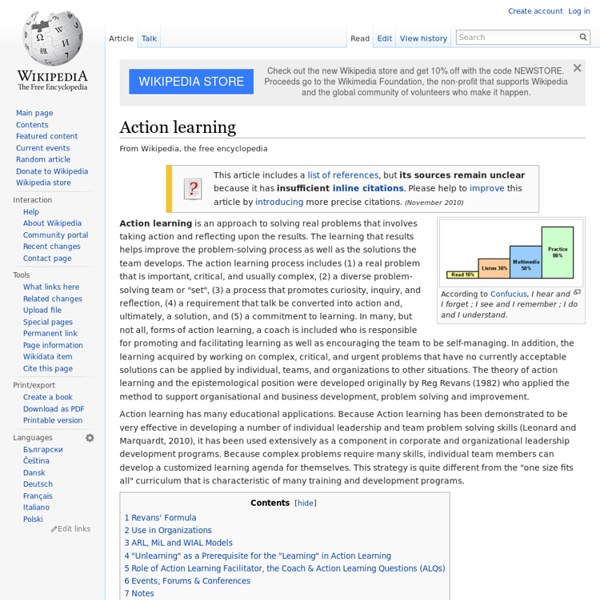Revision control
Revision control, also known as version control and source control (and an aspect of software configuration management), is the management of changes to documents, computer programs, large web sites, and other collections of information. Changes are usually identified by a number or letter code, termed the "revision number", "revision level", or simply "revision". For example, an initial set of files is "revision 1". When the first change is made, the resulting set is "revision 2", and so on. Version control systems (VCS) most commonly run as stand-alone applications, but revision control is also embedded in various types of software such as word processors and spreadsheets, e.g., Google Docs and Sheets[1] and in various content management systems, e.g., Wikipedia's Page history. Software tools for revision control are essential for the organization of multi-developer projects.[2] Overview[edit] Structure[edit] Revision control manages changes to a set of data over time. Integration[edit]
Edward de Bono
Edward de Bono (born 19 May 1933) is a Maltese physician, author, inventor and consultant. He originated the term lateral thinking,[citation needed] wrote the book Six Thinking Hats and is a proponent of the deliberate teaching of thinking as a subject in schools. Biography[edit] Professor de Bono has held faculty appointments at the universities of Oxford, Cambridge, London and Harvard.[1] He is a professor at Malta, Pretoria, Central England and Dublin City University. De Bono holds the Da Vinci Professor of Thinking chair at University of Advancing Technology in Tempe, Arizona, USA.[2] He was one of the 27 Ambassadors for the European Year of Creativity and Innovation 2009.[3] He has written 57 books with translations into 34 languages.[1] He has taught his thinking methods to government agencies, corporate clients, organizations and individuals, privately or publicly in group sessions. Ideas[edit] Critiques[edit] In the Handbook of Creativity, Robert J. Published works[edit]
Antipositivism
Antipositivism (also known as interpretivism or negativism) is the belief in social science that the social realm may not be subject to the same methods of investigation as the natural world; that academics must reject[need quotation to verify] empiricism[dubious ] and the scientific method in the conduct of social research. Antipositivists hold that researchers should focus on understanding the interpretations that social actions have for the people being studied.[1][need quotation to verify] Concept[edit] In the early 19th century various intellectuals, perhaps most notably the Hegelians, began to question the prospect of empirical social analysis. Karl Marx died before the establishment of formal social science but nonetheless fiercely rejected Comtean sociological positivism—despite himself attempting to establish a historical materialist "science of society".[2] Frankfurt School[edit] See also[edit] References[edit] Jump up ^ Gerber, John J.
Bernadette Charlier
Métacognition et réussite des élèves
Ce nouveau site, offrant un meilleur confort de lecture, a pu voir le jour grâce aux généreux dons de nos lecteurs durant notre campagne de financement participatif. Ce n’est qu’une première étape dans notre projet, sont notamment prévues des évolutions importantes dans notre librairie, mais cela prendra plus de temps. Quant au site que vous avez sous les yeux, il est encore un peu en travaux, mais nous avions hâte de le partager avec vous ! Nous comptons sur votre indulgence, chers visiteurs, tout ne sera pas parfait au premier jour. N’hésitez pas à nous signaler les bugs que vous constatez et les évolutions que vous suggérez à partir du formulaire dédié dans la partie une suggestion (aussi accessible en haut à droite du site).
Actualisation du potentiel intellectuel
Un article de Wikipédia, l'encyclopédie libre. Pour les articles homonymes, voir API. L'actualisation du potentiel intellectuel (API) est une technique de remédiation cognitive d'origine québécoise. Proposée par Pierre Audy, professeur à l'UQAT, ce programme tente de répondre aux effets de la privation de médiation dans le développement intellectuel humain. Il s'appuie sur l'apprentissage de stratégies visant à éviter des déséquilibres d'ordre social et/ou scolaire. Selon ce programme, il existe plus de 80 stratégies couvrant trois sphères : l'observation, la recherche de solutions et la stratégie de réponses. Histoire[modifier | modifier le code] En 1980, le psychologue israélien Reuven Feuerstein développe le concept d’expérience d’apprentissage médiatisé et démontre qu’il était possible de modifier à tout âge le niveau d’efficience cognitive des individus. En 1988, Pierre Audy fit les deux constats suivants : Définition[modifier | modifier le code] Voir aussi[modifier | modifier le code]
INTRODUCTION
En France environ 20% des élèves qui entrent en sixième ne maîtrisent que très partiellement l'écrit, 10% sortent sans aucune qualification du système éducatif, 50% seulement avec un titre de niveau V ( c.a.p). Une enquête récente de l’OCDE ( dont la France s’est d’ailleurs retirée au vu des premiers résultats) évalue à 40% le nombre de Français qui ne sont pas capables de lire un texte de façon efficace, c’est à dire d’en sortir les informations qui leur sont utiles. La situation est semblable dans la plupart des pays occidentaux développés, au Québec notamment où le taux d’échec et d'abandon scolaire est énorme: Plus de quarante pour cent des enfants qui devraient être à l’école cessent de la fréquenter avant la fin de scolarité obligatoire Les moyens de remettre dans le circuit social et économique , ces personnes défavorisées, déclassées, actuellement incapables de profiter du système scolaire, puis de s’adapter aux exigences d’un monde en pleine mutation existent -ils?
MEKTOUB : C'est écrit !



